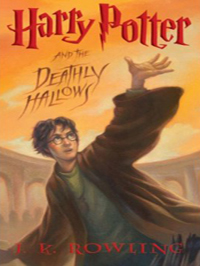
The recent release of "Harry Potter and the Deathly Hallows" marked the magic moment for millions of Harry Potter fans worldwide. The seventh and final book in the wildly popular series signaled the end of a literary global phenomenon.
At Florida State University, a graduate student is researching how the Harry Potter series has enchanted young readers over the years. Colette Drouillard, a doctoral student in FSU’s College of Information, is asking young people about their experiences of growing up with the boy hero and documenting how they influenced their desire to read.
"I will be looking for a sample of readers between 19 and 23 who began reading the stories as they were first released somewhere around 1998 or ’99, and continued to read along as the stories progress as they were released," Drouillard said. "It’s the one group that has the opportunity to discuss how the fact that the character was approximately the same age as they may have impacted their motivation to read."
Since the first Harry Potter book was published in the United Kingdom back in 1997, the adventures of the young wizard who saves Hogwarts, his magical school, from all sorts of trouble have become a fixture in the pop culture landscape. Movies (including "Harry Potter and the Order of the Phoenix," a big hit upon its release earlier this month), toys, video games—and the books, of course—have spawned a multibillion-dollar cottage industry. According to Scholastic Publishing, the U.S. publisher of the Harry Potter books, more than a quarter of a billion books have been sold in more than 200 countries worldwide.
The books aren’t always a child-sized read; some contain more than 800 pages of action-packed adventure. In fact, they have captured the eye of scholars as well as students.
"There have been many academic studies—about 200 on Harry Potter," said FSU College of Information Professor Eliza T. Dresang, who specializes in children’s literacy and is herself an expert on the books. "Yet oddly enough, there has been almost no research in which children were asked what motivates them to read Harry Potter."
Enter doctoral student Drouillard.
While the magical stories may have encouraged young readers, they also have created a devoted following through online video games—and that’s where Drouillard finds her research participants.
"It’s a unique opportunity to speak with readers who are now young adults and ask them to go back and try to recall when you were 9 and read the book the first time, why did you feel motivated to read Book 2, and what motivated you to continue reading," she said.
While Drouillard looks for the motivation of young readers, her own Harry Potter prowess pales in comparison to the kind of fans she met at a recent conference in New Orleans.
"I would have said I was a huge Harry Potter fan until I went to the Harry Potter conference last month and discovered that I really was only minorly obsessed with Harry Potter compared with other people," she said.
But are they as knowledgeable?
"I don’t know about knowledgeable, but they sure have better costumes," Drouillard joked.
For serious fans, however, it’s no laughing matter that "Harry Potter and the Deathly Hallows" is the end of the story.




